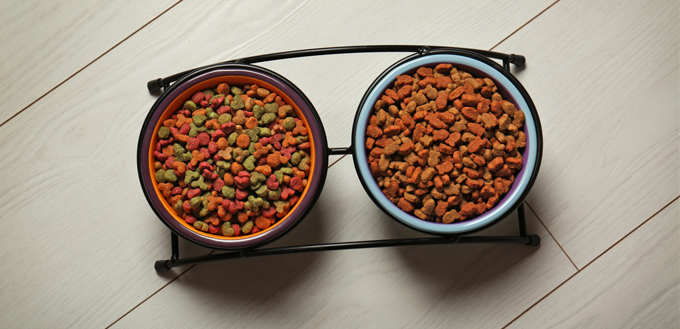If you take the time to scan the ingredients lists for many commercially available pet foods, you are very likely to come across soybean-related products. They are commonly found in both dog and cat food and are present in dry, semi-moist and wet formulations. Soy is even found in some veterinary formulas and prescription diets.
At the same time, you may have also noticed some labels indicating that a particular dog or cat food is ‘free from soy’ and this may have started to alarm you! Is soy something that you should be worried about and is it safe for your pet?

What is Soy?
Soy is a plant that is a member of the legume family along with beans, peas, lentils and peanuts. The plant is native to East Asia but it is commercially grown all over the world as a cheap source of protein. It is widely used in both human and animal foods and is a useful source of protein. Vegans and vegetarians eat soy as an alternative to meat protein although it is interesting to note that some humans are allergic to soy.
You may not see it explicitly listed on the ingredients label of cat and dog foods. It may appear as vegetable broth, textured vegetable protein or TVP. You may also see soy written as soybean meal, soy germ meal, soy flour, soy grits, soy protein concentrate and soy isoflavones.
Why is Soy Added to Cat and Dog Foods?
This is mainly a financial consideration – it’s all about money. Commercially prepared dog and cat foods provide a complete diet for your pet and so they must supply a minimum quantity of all the essential food groups which are carbohydrates, proteins, fats, fiber, and micronutrients such as vitamins and minerals.
Related Post: Best High Fiber Dog Food
Protein can be provided by meat or by vegetables but meat protein (derived from animal sources) is more expensive. Therefore, by substituting soy protein for meat protein, pet food manufacturers can keep their costs down but still provide a high protein diet and a bulky product.
Related Post: Best High Protein Dog Food
What Problems Can Soy Cause?
There are two potential issues associated with adding soy to pet foods. The first area of concern focuses on the quality of the protein. Some experts argue that, for dogs and cats, soy is not a high-quality source of protein. They feel that dogs and cats are carnivores (meat eaters) and should, therefore, obtain their protein from meat sources. It has even been claimed that some of the constituents of soy can be harmful and can interfere with protein digestion and lead to chronic deficiencies. This is of particular concern in cats where the metabolism and gut physiology is geared towards a meat-only diet. Some studies have suggested that soy is linked to high blood sugar levels in cats and to seizures in both cats and dogs.
The second area of concern relates to allergies. Both dogs and cats can suffer from allergies and these can be triggered by food. Ten percent of dog allergies are caused by food ingredients and the figure is thought to be a bit higher for cats.
Soy Allergies in Cats
Food allergies in cats can affect both males and females and any breed. They can become apparent when the cat is a little kitten (from just five months) or can develop when they are quite elderly, up to 12 years of age. However, most food allergies in cats develop between two and six years of age.
Your cat can eat the same food for years and then suddenly become allergic to it. The symptoms are typically itchy skin, hair loss, excessive scratching, and miliary dermatitis and will be present all year around. Your vet will be able to make a diagnosis and help you get to the bottom of what is causing the allergy.
The most common allergens are beef, lamb, seafood, corn, soy, dairy products, and wheat gluten. As cats get very little benefit from the soy that they eat, it makes sense to eliminate it from their diet if you can.
Related Post: Royal Canin Dog Food
Soy Allergies in Dogs
The situation in dogs is not quite as clear and is the subject of scientific debate. Some experts argue that soy protein is useful to dogs as they have guts that are capable of digesting plant proteins. Others argue that it is not a high-quality source of protein and that meat sources are preferable.
Dogs can also suffer from food allergies but soy is just one of the potential suspects. Symptoms include itching and inflamed skin but can include diarrhea. Allergies can develop up to two years after your dog has been eating certain dog food. Dogs can also be allergic to corn, wheat, and other grains. They can also be allergic to meat and beef is the most common culprit!
One study looked at nearly 300 cases of food allergies in dogs found that beef was the most common allergen and that dairy products are also a common problem. In this study, very few dogs were actually allergic to soy. So, whilst protein allergy is certainly common in dogs, it is not always the soy that is causing the problem.
Related Post: Best Dog Food for Allergies

The Final Word
Given the potential for soy to cause harm to cats, and the fact that it provides very little nutritional value for them, it makes sense to avoid it in commercial cat foods if you are able to. If your cat does develop allergic symptoms it should certainly be one of the candidates that are investigated.
In dogs, allergies are often caused by other proteins and soy may not be to blame. Also, they are able to get some benefit from plant-based proteins. However, if your pooch becomes ill, you should certainly discuss eliminating soy from their diet with your vet. This will not be hard to do as the majority of the high-protein premium dog foods are already free from soy.
Sources:
- Understanding Common Pet Food Ingredients, PetMD
- Dr Pippa Elliott BVMS, MRCVS, How to Choose Safe Pet Food, wikiHow
- Rania Gollakner, BS, DVM, Soy Protein, VCA Hospitals







Thank you for the info I have done research and found your article very helpful my cat was diagnosed with hypothyroidism and I changed her food completely took her off all foods containing soy and chemicals and I believe she is either completely or almost completely cured of the hypothyroidism I’ve changed cat litter and cat food both canned and dry and it has helped her and my other cat as well She is 15 years old so thank you